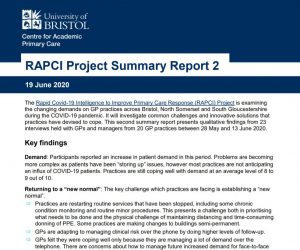Investigating changing demands on primary care during COVID-19: Summary report 2
19 June 2020
The Rapid COVID-19 intelligence to improve primary care response (RAPCI) project is examining the changing demands on GP practices across Bristol, North Somerset and South Gloucestershire during the COVID-19 pandemic. It will investigate common challenges and innovative solutions that practices have devised to cope.
This second summary report presents qualitative findings from 23 interviews held with GPs and managers from 20 GP practices between 28 May and 13 June 2020.
Overview of findings
Participants reported an increase in patient demand in this period. Problems are becoming more complex as patients have been “storing up” issues, however most practices are not anticipating
an influx of COVID-19 patients. Practices are still coping well with demand.
The key challenge which practices are facing is establishing a “new normal”. Practices are restarting routine services that have been stopped, including some chronic condition monitoring and routine minor procedures. This presents a challenge both in prioritising what needs to be done and the physical challenge of maintaining distancing and time-consuming donning of PPE. Some practices are making changes to buildings semi-permanent.
GPs are adapting to managing clinical risk over the phone by doing higher levels of follow-up. GPs felt they were coping well only because they are managing a lot of demand over the telephone. There are concerns about how to manage future increased demand for face-to-face
(F2F) consultations, for example if there is an increase in viral and respiratory illness as lockdown eases or over the winter.
New challenges faced in this period included adjusting appointment slots to cope with rising numbers of F2F consultations. Practices are finding it challenging to manage patient expectationsthat services are restarting as normal, while some specialties are still not accepting referrals. Participants also reported that the current mode of operating is taking a toll on staff.
Some participants are concerned that the current mode of operating is increasing health inequalities. GPs noted, particularly in more deprived areas, that many of their elderly patients were unable to use smartphones and computers to send photos or connect to a video consultation, even if they had access to them.
Citing this report
This report should be cited as:
Murphy, M. Turner, A. Denholm, R. Scott, L. Scott, A. Macleod, J. Salisbury, C. Horwood, J. RAPCI Project Summary Report 2, 19 June 2020. Centre for Academic Primary Care (CAPC), University of Bristol. Available from
http://www.bristol.ac.uk/media-library/sites/primaryhealthcare/documents/rapci-project/RAPCI%20Summary%20Report%202.pdf
Download the full report
